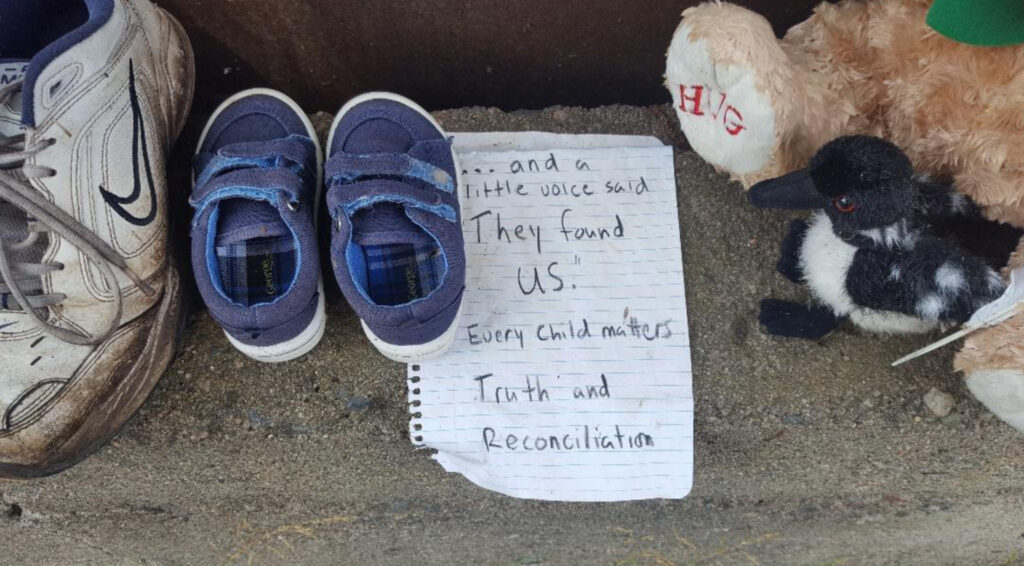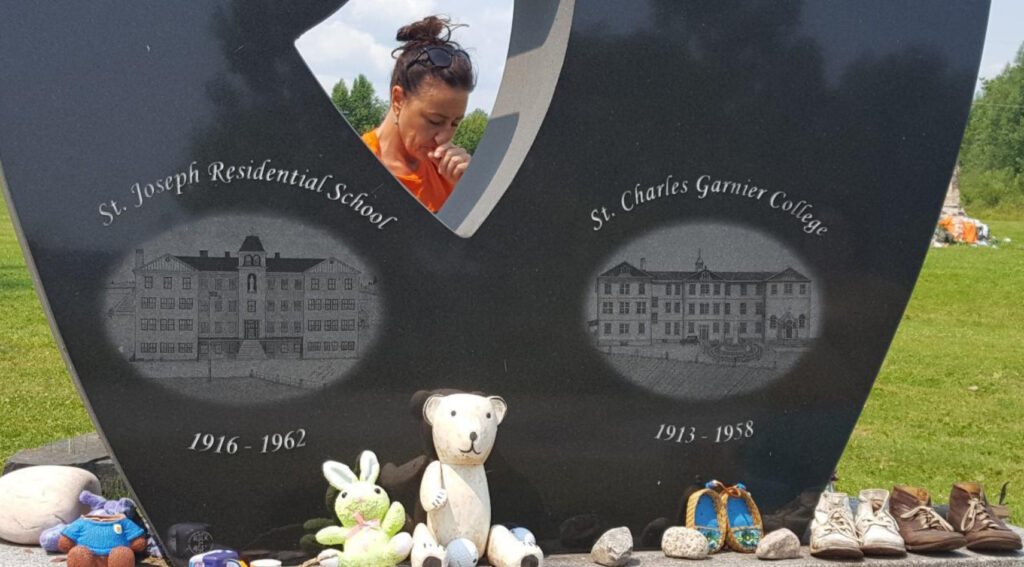“Say something. Do something…” these words were spoken by Abigail (not
her real name), a survivor of the residential school system. Simple words that express
so much pain and hope.
“Say something. Do something… because…
“I ran away from the residential school when I was 14. I travelled 2 weeks on the road
in the middle of winter, begging food and shelter on the way. When I got home, I was
afraid my mother would send me back. She looked at me and said:” I love you; you’re
not going back.”
“I was nine years old and forced to pray on my knees all night next to my bed for
something I had done wrong, I don’t even remember what it was. All I remember was
waking up in the morning with my head on my mattress.”
“One day two of my friends ran away… we never saw them again”
“On the second floor of the Spanish Residential School were Visitors Rooms. There
were two. One for the elite visitors like the government and church officials, and another
room for our parents and family. Even in the school our lives were segregated.”

“Three times a year (Christmas, Easter and Summer) we were sent home to see our families. Some had no family to visit and stayed in the school. I remember walking to the bus taking us away and, seeing a small hand under an open window sash, slowly waving goodbye. I cried.”
“On our Reserve we still can’t drink the water without boiling it first.”
“Every family on our Reserve has experienced the tragedy of suicide and addiction”
Say something. Do something… What have we said or done to reconcile with our Indigenous brothers and sisters?
In July, I (Michel David, International Counsellor and JPIC Team Leader, OFS Canada) participated in a three-day Spiritual Retreat at
the Anishinaabe Spiritual Centre in Espanola, Ontario (Spanish is a town in the province of Ontario, located on Trans-Canada Highway 17 in
the Algoma District near the border of the Sudbury District). The retreat had been organized by Kateri Native Ministry (Ottawa). Approximately 20 of us met around a Sacred Fire. We came in solidarity from as far as Akwesasne in Québec, Hamilton in Southern Ontario, and the upper Great Lake lands. We came to listen, share, pray, and remember the children who died at the Spanish Residential School less than an hour away.
Cultural genocide is a difficult talking point, but this is exactly what happened according to the Canadian Historical Association: “The Canadian Historical Association, which represents 650 professional historians from across the country, including the main experts on the long history of violence and dispossession Indigenous peoples experienced in what is today Canada, recognizes that this history fully warrants our use of the word genocide……”
Say something. Do something … Listen
I participated in the Talking Circle, also called a Peacemaking
Circle and a traditional North American Indigenous practice
“based upon equality between participants and the principle of
sharing power with each other instead of having power over
one another.”
In the Circle, with a Sacred Fire burning, we welcomed the
sunrise and welcomed the new day. We shared, we listened,
we cried. At sunset we thanked the Creator for the many
blessings of our day. We contemplated what we had learned
and what steps we could take to put our reconciling heart into action.
Let’s be honest with ourselves, everyone seems to have an opinion about what the
Church should do, or the politicians, or Indigenous Peoples… but very few of us look
inward and take responsibility to act with justice, peace and integrity.
Say Something. Do Something…. but what?
For many of us, we avoid taking personal responsibility and action by doing the least
possible such as passing on Memes and PDFs on the Internet, or giving a donation to a
group supporting clean water, or some other basic need… and then we figuratively wipe
our hands clean (like Pilate) and think, I have done what I can do, the rest is up to
someone else. Is it really?
Every time more graves are discovered our hearts ache. Is our sum total of action to be
a pointless blaming of the Church, and the Provincial and Federal Governments?
The message of Jesus was simple: “Love one another as I loved you” So, what do we
need to do to love one another and reconcile? What does reconciliation even mean?
Merriam-Webster describes it as an “act of causing two people or groups to become
friendly again after an argument or disagreement or, the process of finding a way to
make two different ideas, facts, etc., exist or be true at the same time.
There is a great weight on our shoulders for the wrongs committed by our Church and
Governments. We cannot brush this away with an apology and a bag of money. We
need to educate ourselves and our society about what really happened and change the
dialogue from: This is your story… to: This is our story. Finding out what happened and
what went wrong is only half the solution, the other half is deciding what will be done
about it?
Say something. Do something……. How?
There are many places you can turn to for help. As Franciscans, we should take
seriously the mandate of Rule 15 “Let them individually and collectively be in the
forefront in promoting justice by the testimony of their human lives and their courageous
initiatives. Especially in the field of public life, they should make definite choices in
harmony with their faith.”
At first, I felt like an outsider looking in, but when the retreat ended, I understood that I
too belong, I too am part of the Circle and I too have a role to play in reconciliation. I
need to raise both my own and others’ awareness about colonization and its ongoing
effects on Indigenous Peoples. If we are not part of the solution, we are part of the
problem.
Listen:
Circles for Reconciliation The aim of Circles for Reconciliation is to establish
trusting, meaningful relationships between
Indigenous and non-Indigenous peoples
as part of the 94 Calls to Action from the
Truth and Reconciliation Commission.
La réconciliation est un cercle à la fois 10
rencontres, 10 personnes, une occasion de
mieux se comprendre entre Autochtones et
non-Autochtones.
Reconciliation Canada Do you have a back
pocket reconciliation action plan?
Act:
Catholics for Truth and Reconciliation This website is an “invitation for Catholics to
ignite or deepen our commitment to Truth and Reconciliation alongside Indigenous
peoples through donations and action pledges.” Check out their suggested action
webpage and post your own commitment to Reconciliation. (English and French content
available).
Stratégie de réconciliation avec les peuples autochtones 2020-2025
Montréal « franchit un important jalon dans la
réconciliation avec les peuples autochtones en
adoptant une Stratégie qui est l’aboutissement de
plusieurs années de collaboration et d’efforts. »
Say something. Do something.
Restez au courant des actions et des problèmes liés à JPIC et afficher en favori
Chemins Franciscains à l’adresse https://www.cheminsfranciscains.ca/le-siaf
Stay up to date on JPIC Issues and Actions and bookmark Franciscan Voice Canada at
https://www.franciscanvoicecanada.com/
